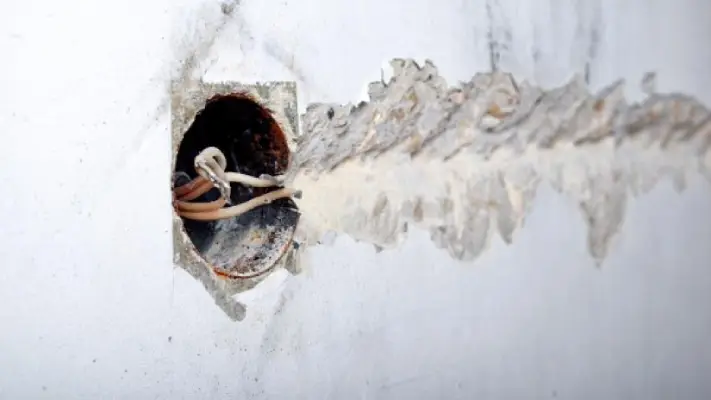
To check for aluminum wiring in your home, follow these steps from Mr. Electric.
|
Between the 1960s and mid-1970s, home builders decided to save money by exchanging the more expensive copper wiring for aluminum wiring. Both metals conduct electricity, so what’s the concern? What’s wrong with aluminum wiring?
Well, the practice was discontinued in the 1970s due to significantly increased fire hazards associated with aluminum wiring. Continue reading to learn how you can identify if your home has aluminum wiring, the hazards of aluminum wiring, and what you can do about it.
What’s Wrong with Aluminum Wiring?
Aluminum wiring gets far hotter than copper. It’s also softer than copper and expands more when it heats up. All these attributes lead to a huge disadvantage. The excessive heat affects the soft metal, which is more prone to warping over time. The shape and size fluctuations (due to constant heating and cooling) cause the wires to come loose from their connections. Aluminum can also rust, which limits the flow of electricity. Appliances will draw more electricity to make up for the loose connections and rusting, which will cause more friction and more heat in the wires, potentially escalating to a fire.
Related Topic: Electrical Wire Color Codes
Is Aluminum Wiring Safe?
Although aluminum wiring can conduct electricity safely, it is not considered safe to wire homes with due to the poor electrical connections that cause increased fire hazards. Surprisingly, aluminum wiring is commonly and safely used for power grids, utility companies, and even in some airplanes.
The Consumer Product Safety Commission (CPSC) released a survey in 2011 indicating homes with aluminum wiring built before 1972 were 55 times more likely than homes with copper wiring to have at least one electrical outlet in fire hazard condition.
How to Identify Aluminum Wiring
How do I know if I have aluminum wiring? Perhaps the house wasn’t built in that 1965-1972 period. Is it still possible to have aluminum wiring? Unfortunately, yes. Any rooms built on, or electrical work done during that time frame would have used aluminum wiring. So how do you know you have it? What does aluminum wiring look like?
- Warm or discolored outlets. If the outlet covers are warm to the touch, it indicates the electrical wires are generating excessive heat. That could be due to aluminum wires and the heat they produce to conduct electricity. Discolored outlets are another sign of too much heat, and potential burning.
- Arcing or shocks. If the outlet sparks or shocks you when you plug in an appliance, it’s a sign of a poor electrical connection, which happens frequently with aluminum wires.
- Flickering lights. Flickering lights could be caused by several things, including loose bulbs or issues with the light fixture, but this may also indicate poor electrical connections due to deteriorating aluminum wires.
- The smell of hot plastic. If you smell burning plastic near an outlet or wiring, it may be the insulation melting off the wires from the excessive heat produced by the aluminum wiring.
- Faulty light fixtures. Light bulbs that burn out too fast could be the result of poor electrical connections. The outlet may draw an irregular flow of electricity from aluminum wiring, shorting out the bulb.
- Buzzing sounds. If you hear buzzing or sizzling sounds near an outlet or light switch, there is excessive heat. It may melt the wiring’s insulation and is a potential fire hazard.
- Wiring insulation labels. Behind the outlet cover, you may be able to see some of the plastic covering that insulates and protects the wire. If you can see ALUMINUM, ALUM, or AL either printed on or etched into that wire covering, you have aluminum wiring.
Related Topic: Electrical Wiring for Home Office for Better Productivity
Benefits of Replacing Aluminum Wiring
One might think, it’s lasted this long, why should I change the aluminum wiring in my house? Well, there are benefits to replacing aluminum wiring. Because aluminum can be easily damaged, replacing it with copper would offer more reliable electrical connections through the walls. Replacing the wiring decreases the risk of electrical fires and shocks, and will give you peace of mind. As homeowners, all repairs should focus first on safety, and aesthetic after. That’s because our homes are our safe-havens. Call your local licensed electrician to bring your wiring up to current safety standards, and—most importantly—know that you and your home are in good hands.
Contact Mr. Electric for Expert Help
You have worked too hard making your house a home to run the risk of letting faulty aluminum wiring cause an electrical fire. Call Mr. Electric® or schedule an appointment online today.
